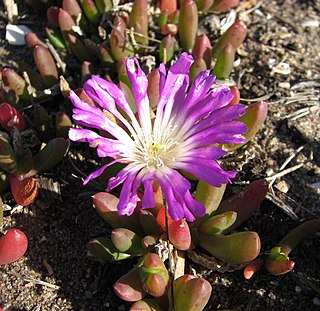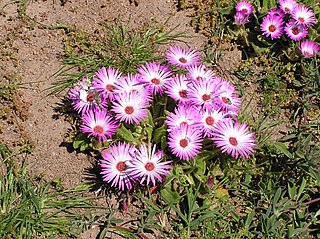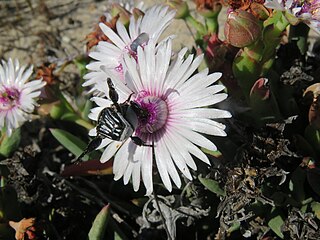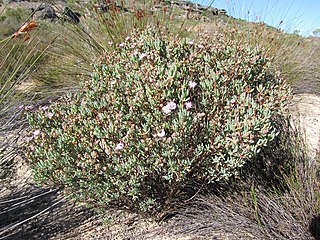
The Aizoaceae, or fig-marigold family, is a large family of dicotyledonous flowering plants containing 135 genera and about 1800 species. They are commonly known as ice plants or carpet weeds. They are often called vygies in South Africa and New Zealand. Highly succulent species that resemble stones are sometimes called mesembs.

Lampranthus is a genus of succulent plants in the family Aizoaceae, indigenous to southern Africa.

Mesembryanthemum is a genus of flowering plants in the family Aizoaceae, indigenous to southern Africa. As with many members of that family, it is characterized by long-lasting flower heads. Flowers of Mesembryanthemum protect their gametes from night-time dews or frosts but open in sunlight. There is an obvious evolutionary advantage to doing this; where sun, dew, frost, wind or predators are likely to damage exposed reproductive organs, closing may be advantageous during times when flowers are unlikely to attract pollinators.
Aptenia was a small genus of flowering plants in the family Aizoaceae, which as of January 2024 was treated as a synonym of the genus Mesembryanthemum. Species formerly placed in the genus are native to southern Africa. The genus name is from the Greek a- (not) and ptenos (winged), and refers to the wingless fruit capsules.

Drosanthemum ("dewflowers") is a genus of succulent plants in the ice plant family native to the winter-rainfall regions of southern Africa, including Namibia and the Cape Provinces and Free State of South Africa. Most species bear colorful flowers.

Disphyma is a genus of flowering plants in the family Aizoaceae that are native to New Zealand, Australia and southern Africa. Plants in this genus are prostrate, annual or short-lived perennial shrubs with succulent leaves and daisy-like flowers arranged singly on the ends of shoots with petal-like staminodes, many stamens and usually five styles.

Aizoon or Aizoön is a genus of flowering plants in the iceplant family, Aizoaceae.

Cleretum is a genus of flowering plants in the family Aizoaceae, native to the Cape Provinces of South Africa.

Vanheerdea is a genus of flowering plants belonging to the family Aizoaceae. It is also in Tribe Ruschieae.
Hammeria is a genus of flowering plants belonging to the family Aizoaceae.
Skiatophytum is a genus of flowering plants belonging to the family Aizoaceae.
Esterhuysenia is a genus of flowering plants belonging to the family Aizoaceae.

Erepsia is a genus of flowering plants belonging to the family Aizoaceae.
Leipoldtia is a genus of flowering plants belonging to the family Aizoaceae.
Octopoma is a genus of flowering plants belonging to the family Aizoaceae.

Phiambolia is a genus of flowering plants belonging to the family Aizoaceae.

Schlechteranthus is a genus of flowering plants belonging to the family Aizoaceae.

Ruschiella is a genus of flowering plants belonging to the family Aizoaceae.
Drosanthemopsis is a genus of flowering plants belonging to the family Aizoaceae.












